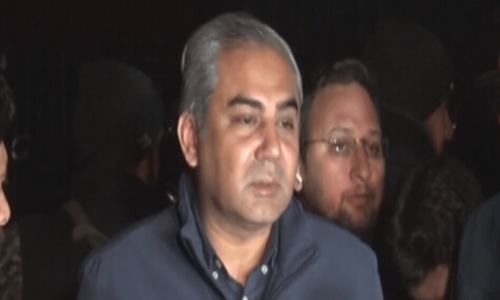
KARACHI: Trawling through the Pakistan Papers re-confirms much of what has been established since the first cache of US diplomatic cables was published last November.
The US is neither omnipotent nor omniscient — it often reacts to events in Pakistan rather than dictating outcomes. But the US is a very influential player in Pakistan.
If there is a theme as such in the 4,000-plus cables read by Dawn, it is the unparalleled access Americans enjoy in Pakistan.
Hardly surprising, though it is something else to see it in black and white, over and over again, in cable after cable.
The political class is seen perennially knocking on the doors of American officials to share information and vie for support.
And American officials appear to have open-door access at the highest echelons of political and military power in the country.
Take a secret cable sent by Bryan Hunt, the former Principal Officer at the US consulate in Lahore, in late January 2009. At the time, the country had been rocked by the PPP’s attempt to form a government in Punjab and everyone everywhere was racing to figure out how the plot would unfold.
But not the Americans. From Moonis Elahi to Khwaja Saad Rafique to Humayun Akhtar Khan, Punjab’s politicians were falling over themselves to explain the inside story to Hunt.
“PML leader Humayun Akhtar Khan recently told Principal Officer that the party was under significant pressure from ‘the establishment’ — the local euphemism for the military and intelligence services — not to become embroiled in the PPP/PML-N conflict at this stage. ‘The establishment’ preferred that the party remained neutral and in opposition for the time being as ‘additional alternatives might emerge,’” Hunt, then the go-to guy for Americans on all things Punjab, recorded in his cable.
But Punjab’s famously mercenary politics wasn’t limited to the usual suspects of turncoats and freelancers. Hunt goes on to state, “While all the politicians were quick to claim that they rejected the overture [from the establishment], each took pains to point out that similar approaches were doubtless made to others who might be more amenable to the suggestion. Some even admitted that they might be tempted to support such an idea in the future if the current government proved unable to deliver.”
Even religious parties and figures were liable to open up to American officials in a way that most Pakistani interlocutors would envy.
Maulana Fazlur Rehman’s overture to the Americans is well-known by now. But the extent of information sharing and cooperation becomes clearer in a secret cable originating from the Islamabad embassy in July 2006:
“Senior officials from the Islamist Jamiat Ulema-i-Islam Fazlur Rehman (JUI-F) report increasing concern over the influence and activities of Pakistani Taliban sympathisers in the Federally Administered Tribal Areas (Fata), border areas of Balochistan, and certain districts in the North West Frontier Province (NWFP)…. Officials contend that Pakistani Taliban sympathisers have been angered by JUI-F’s failure to stem military and law enforcement actions against them and by its willingness to cooperate politically with the GOP.”
And then, the penny drops: “[Senior JUI-F officials] sought USG support in pressing the GOP to cooperate more fully with JUI-F and Deobandi clerics in seeking a negotiated end to the current stalemate in the Waziristans as a first step towards countering this trend.”
Elsewhere, in a July 2009 secret cable, Hunt records meeting a “well-placed Deobandi religious leader” in which details were shared about the “extremist group Sipah-i-Sahaba (SSP) … increasing its activities in the central Punjab city of Faisalabad … in collaboration with elements of the Tehrik-i-Taliban (TTP) and a splinter group from the banned terrorist groups Jaish-i-Mohammad.”
But it’s not just the politicians who are seen earnestly sharing private assessments with the US. In October 2008, a secret cable titled ‘Kayani exercises influence with new military appointments’ notes: “Kayani told CJCS Mullen in September that he would use the Army’s normal promotion and rotation schedule to increase his control over military operations, particularly those of ISI. Kayani identified Pasha and Khan as his best two major generals, and he has now placed them in two critical posts.”
Access, though, does not translate into knowing or understanding everything, and certainly not controlling events.
Particularly in the fight against militancy, American officials are often seen struggling to shape outcomes and even establish the facts.
A secret April 2008 cable originating from Islamabad on a prisoner swap being contemplated by Pakistan is illustrative of American constraints: “Ambassador told [Rehman Malik, then the adviser on interior to the prime minister] the USG strongly objected to the plans of Inter Services Intelligence (ISI) to exchange some of the Al Qaeda and Taliban-associated operatives for captured soldiers and for Pakistan’s ambassador to Afghanistan. Malik replied that there was something ‘fishy’ about the abduction of the Pakistani ambassador to Afghanistan.”
The cable does not clarify what Rehman Malik’s suspicions were, but perhaps that only underlines the difficulty of establishing the facts in the murky world of militancy.
And if the facts are hard enough to establish, sometimes the decisions are even tougher.
A secret January 2009 cable by then US Ambassador Anne Patterson entitled ‘The way forward for Pakistan’s F-16 program’ carries this assessment: “The bottom line is that Pakistan cannot afford the $2bn required to complete the F-16 program.
“At the same time, nothing is more important to good military-military (and overall US-Pakistani) relations than avoiding a blow-up over the F-16 case.”
Unrivalled access but murky facts and difficult trade-offs — the Pakistan Papers tableau confirms what many already suspect: Pakistan is a hard country.












































